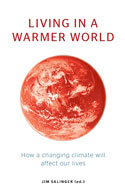 Rodney Hide’s regular opinion slot in the Herald on Sunday has often provided the former ACT Party leader with a platform to spout his trademark climate denialist nonsense, but yesterday’s has to take some kind of biscuit ((Girl Guide, perhaps, or Garibaldi?)) for purveying unsubstantiated, completely made up nonsense. He starts by riffing on new research that suggests that an increase in Pacific winds has acted to slow down global temperature increases, and then goes completely off his trolley:
Rodney Hide’s regular opinion slot in the Herald on Sunday has often provided the former ACT Party leader with a platform to spout his trademark climate denialist nonsense, but yesterday’s has to take some kind of biscuit ((Girl Guide, perhaps, or Garibaldi?)) for purveying unsubstantiated, completely made up nonsense. He starts by riffing on new research that suggests that an increase in Pacific winds has acted to slow down global temperature increases, and then goes completely off his trolley:
Scientists predict that when the Pacific trade winds slow global warming will take off with a bang. Armageddon remains on.
Climate scientists say the best policy is still one that bombs us back to feudal times.
Not to put too fine appoint on it, that is distasteful nonsense; a misrepresentation at best, a lie at worst — but either way the opinion editor of the Herald On Sunday should be ashamed for permitting it to appear in the paper.
Hide’s statement is wrong on many levels. Climate scientists seldom directly advocate for policy (beyond the need for urgent cuts in carbon emissions). And nobody outside of a looney right-wing think tank has ever suggested that cutting carbon will “bomb” anyone back to the middle ages. It’s cheap and easy rhetoric from a man with a column to fill, and no fact checker on duty at his newspaper.
To get a better perspective on the research Rodney is attempting to spin to his cause, check out this commentary by Mike Mann, or Dana Nuccitelli’s excellent explanation at The Guardian. It’s fascinating stuff, and deserves better than a once-over lightly from an ideologue with an agenda.
Hide then hops onto another pseudo sceptic hobbyhorse: the climate models:
One hundred years is a long time to have to wait to see if the models are correct.
The poor results so far don’t prove anything. And none of us will be alive to see if the models are actually correct.
He’s wrong about that, too. For an example of just how good the models can be, check out this blog post by professor of computer science Steve Easterbrook which compares the EUMETSAT year of weather video noted at Hot Topic recently with a visualisation of a year’s weather patterns from the atmospheric component of NCAR’s CCSM climate model. Run the the two animations side-by-side.
That’s how good our general circulation models are, and that’s how wrong Rodney Hide is. Again ((Construction adopted to please @davidslack)).
Like this:
Like Loading...


 This powerful article by
This powerful article by 
 This year really has started with a bang. An
This year really has started with a bang. An 
You must be logged in to post a comment.